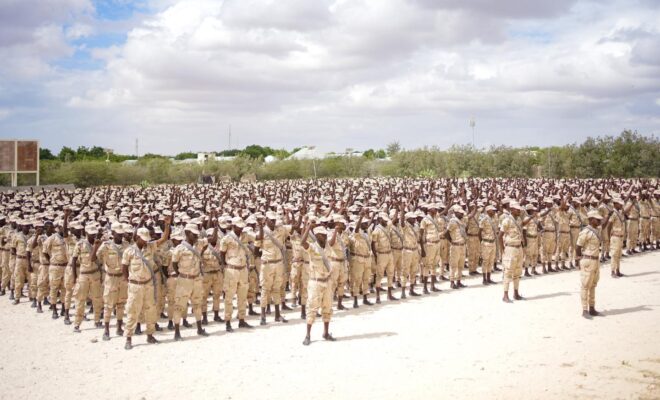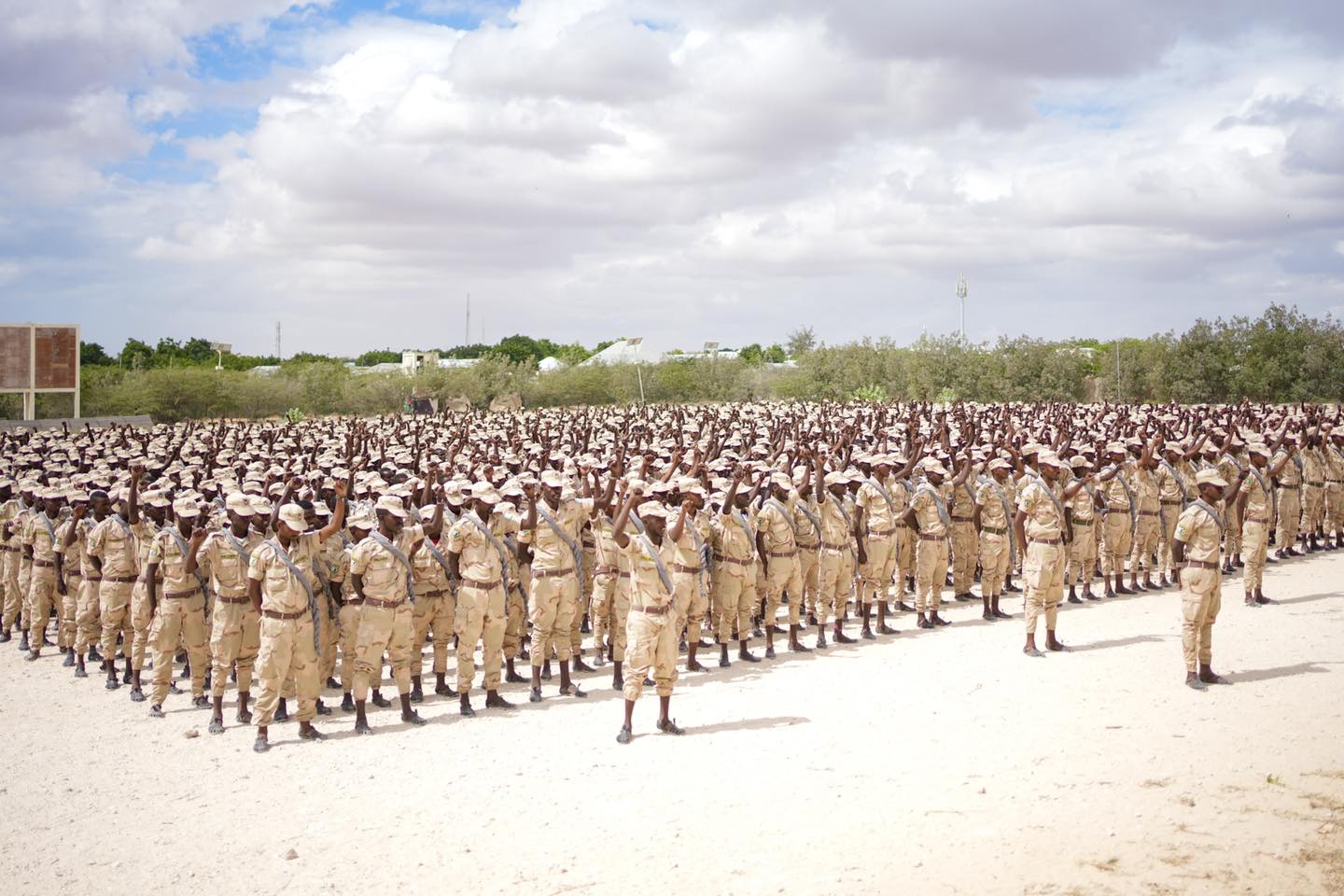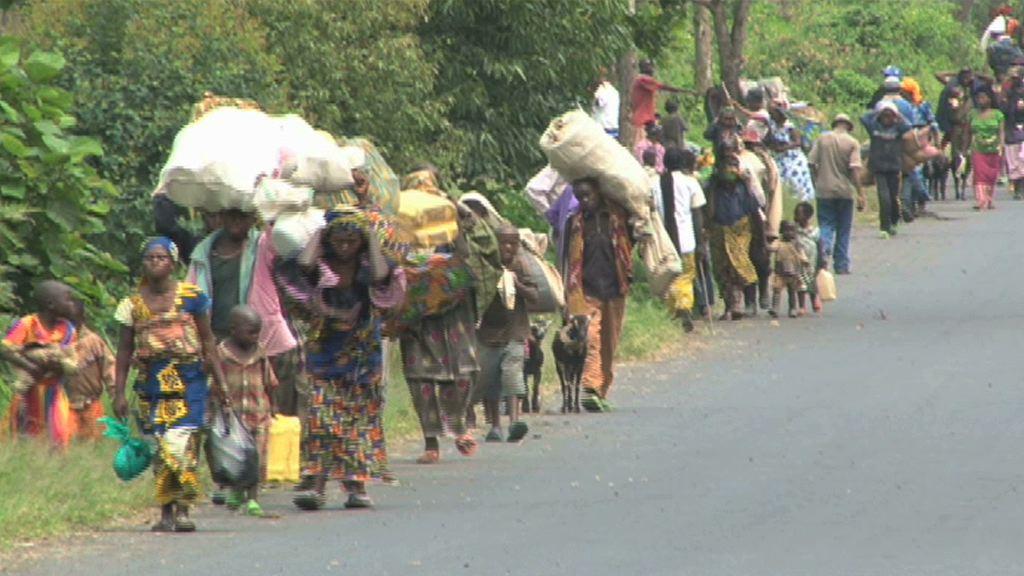The unexpected success of Somalia’s new fight against Al Shabaab

Why the new Somalia president’s declaration of war against the al-Qaeda-linked al-Shabaab is generating a national zeitgeist.

Somali National Army troops in Mogadishu on their return from training in Eritrea in Jan. 2023. (Photo courtesy: Villa Somalia)
During Ramadan, there was much talk in the domestic media of the Somali government’s new offensive against Al-Shabaab, the Al-Qaeda-linked terrorist group. While the details were not public, there was real excitement that this offensive, led by President Hassan Shiekh Mohamud, would further weaken the terrorist group and precipitate the end of their 16-year reign of terror. It’s worth noting that throughout these public discussions, the fear of Al-Shabaab retaliation, which had previously forced many key partners into silence or to sit on the fence, was gone. There is a sense now that the fight to free Somalia of terrorism has finally become the biggest national priority.
For the past decade, most of the Somali population and media, including those pivotal to the fight against Al-Shabaab, took a back seat for various reasons, including fear and private sympathy with Al-Shabaab. After securing a historic second term in office after the delayed elections last year, President Hassan Sheikh Mohamud, made it clear that sitting on the fence was no longer possible. In a passionate televised statement he said “you are either with us or with Al-Shabaab and there can be nothing in between”. This was the strongest rhetoric yet used by any Somali President to enlist the full support of the Somali citizenry.
The evidence thus far shows that the president’s efforts to mobilize local militias known as Macawisley and get them to fight alongside the Somali National Army has swayed opinion and public support in his favor. The liberation of areas from Al-Shabaab’s control – many areas from which the government retreated more than a decade ago – is generating hope among ordinary Somalis that Al-Shabaab can be defeated because the government “[is] serious this time”, according to a senior clan leader who did not want to be identified because he is actively on the frontline leading Macawisley forces.
The Somali government knows that to fight Al-Shabaab successfully, it needs public support. It is doing this now by supporting the local community militias to stand up to Al-Shabaab with the backing of the Somali National Army and by providing basic stabilization assistance in line with its financial abilities. This determined action and clear communication and leadership from President Hassan Sheikh Mohamud to mobilize the Somali people and international partners through directed messages and international engagements, is starting to win the confidence of the major clan elders and their communities as well as international partners. This strengthening partnership is what is sustaining the fight and delivering one victory after another on the battlefield for Al-Shabaab today.
The Somali business community is among the region’s most industrious and innovative. Yet, for over a decade businesspeople lived with the fear of murder, bombings and kidnappings if they did not pay the ransom demanded by Al-Shabaab.
The problem was that the federal government and federal member states did not inspire confidence that they could protect business from the terrorist group’s attacks; most businesses paid extortion just to survive. With a national campaign against the terrorist group directed by the federal government and with the support of some of the federal member states and the Macawisley community militias, this is changing.
The Somali Federal Government has spoken to business leaders directly to instruct them not to pay extortion payments to Al-Shabaab and to pay their fair and due taxes to the government to finance and expedite the war against terror. President Hassan Sheikh Mohamud even chaired two meetings of the National Anti-Money Laundering Committee (NAMLC). Led by the Minister of Finance and involving various government ministries, departments and agencies including the Ministry of Justice, and the National Intelligence and Security Agency, the message that uncooperative businesses will be closed and owners prosecuted is being emphatically pushed through. This is historic in the fight against Al-Shabaab, especially given how tentative the business community has been on the issue.
Moreover, the federal government has promised to use the existing Anti-Money Laundering laws and the newly passed Anti-Terrorism Bill against those businesses which engage Al-Shabaab in any way, let alone give in to their demands for extortion. This, while necessary and tough, has been welcomed by most in the business community. It has led to the closures of hundreds of false accounts in banks and Money Transfer Businesses, decimating Al-Shabaab’s financial supply line. While arguably, the Somali government’s partnership with the business community is multifaceted, it is employing both the carrot and the stick by appealing to their nationalistic sentiments and future business aspirations while threatening legal action if they deviate for any reason – including fear of reprisal attacks.
The Somalia Islamic scholars have held many meetings in support of the government’s fight against Al-Shabaab, and the appointment of the onetime leader and founder of the group, Muktar Robow as the Minister of Religious Affairs, has effectively coopted an influential voice in radical Islamist circles. While many questioned the president on the wisdom of this appointment, he has argued in media interviews that Minister Robow is an important asset who both understands the terrorist group’s operations and can effectively counter their doctrine of ideological violence by uniting the different Islamist factions within Somalia.
One of the most successful outcomes of Robow’s tenure is the historic meeting of the differing religious groups which branded Al-Shabaab as Kawariij (deviants, in their interpretation of Islam) in a four-day conference in Mogadishu, attended by the President and Prime Minister. Some of the most eminent religious scholars argued that they were supporting the government openly now because they are tired of being afraid and could no longer stand by as the peaceful Islamic religion was distorted by terrorists to justify terrorism.
The catalyst for this new national partnership against Al-Shabaab remains the local victories of the Macawisley forces, which continue to fight alongside the national army to liberate more territory from Al-Shabaab. The strong commitment and leadership from President Hassan Sheikh Mohamud who has framed this fight as an existential contest for Somalia gives added impetus to key local and national partners to join in.
However, with limited financial resources, a UN arms embargo, and slow national and international resource mobilization for vital stabilization activities required to maintain security and stability in newly liberated areas, there are questions about the viability in the long run of these newly-formed national partnerships.





